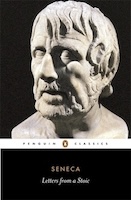kuniga.me > Books > Letters from a Stoic
Letters from a Stoic

Book by Seneca. I admire the stoic way of life and strive to follow it, so reading this book was very pleasant and reaffirming to me. This book is a collection of letters from Seneca to his friend Lucilius. The letters are numbered but are not contiguous - I don’t recall if it was due to the editor not including them because they’re not relevant or repetitive or if they got lost or the text corrupted.
I’ll mostly add selected quotes from the book and leave some comments. To start, on Letter II, Seneca says this about wealth:
It is not the man who has too little who is poor, but the one who hankers for more.
This is a point he repeats many times in other letters. On desire and pain Letter V:
Limiting one’s desire actually helps to cure one of fear”
I believe he repeats this point over in different contexts. This reminds me a lot of Buddhist teaching that desire causes suffering. On Letter VI, he describes his pleasure in teaching:
Nothing (…) will ever give me any pleasure if the knowledge is to be for my benefit alone
On Letter XXIII he quotes Socrates to criticize traveling as a escape mechanism:
How can you wonder your travels do you no good, when you carry yourself around with you? You are saddled with the very thing that drove you away.
On Letter XXXIII, he criticizes people who quote others and suggest instead that one comes up with original content. I’m going against that here by quoting him. I doubt though that most of Seneca’s thoughts are original and not inspired by someone else.
On Letter XLVII Seneca, in the context of treating slaves, concludes:
Treat your inferiors the way you would like to be treated by your superiors.
On Letter XLVIII, he comments on focused learning:
Isn’t it the height of folly to learn inessential things when time is so desperately short?
This is something I try to remind myself from time to time. On not fearing death, Letter LIV says:
What does it matter, after all, whether you cease to be or never begin when the result of either is you do not exist.
on the same lines, Letter LXXVII, says:
Life itself is slavery if the courage to die is absent.
still on the topic of death, Letter XCI says:
In the ashes, all men are levelled. We’re born unequal we die equal.
On only looking forward, but never reflecting about the past, Letter LXXXIII:
We think about what we are going to do, and fail to think about what we have done, yet any plans for the future are dependent on the past.
Letter CVIII, on addiction or bad habits:
With some things less effort of will is required to cut them out altogether than to have recourse them in moderation.
I agree. One example that comes to mind is smoking: it’s easier to not smoke than try to smoke just a little. On the same letter, he remarks:
I should describe old age itself as a kind of incurable sickness
I read this book in 2023 right after Lifespan by David Sinclair, where he makes the case that aging is a disease. I found the coincidence fascinating.
In Letter CXIV he criticizes those who make vague statements to sound deep:
There are some who cut their thoughts short and hope to win acclaim by making their meaning elusive
On the last letter of the book, Letter CXXIII, he makes a more controversial statement:
Pleasure is a poor and petty thing. No value should be set on it: it’s something we share with dumb animals - the minutest, most insignificant creaturs scutter after it